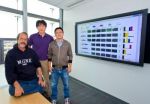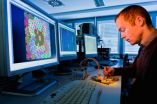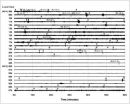(Press-News.org) COLUMBIA, Mo. – As the economy and job market continue to recover, many young adults have moved in with their parents to save money. For teens and 20-somethings who grew up in foster care, saving money is especially difficult because they have aged out of a system that provided support in earlier years and lack important family ties they can depend upon, particularly as they enter adulthood and embark on their own. Now, a University of Missouri child welfare expert says youths in foster care need financial education and support to build assets so they can become financially independent adults.
"The key to ensuring financial stability for these young people is allowing them to juggle responsibilities and even to make some mistakes—just as their peers outside the foster care system do—in order to truly understand how their decisions impact their finances," said Clark Peters, an assistant professor of social work at MU. "Those growing up in intact families often have strong networks to rely on when they've made bad financial decisions—like buying cars straight out of school when they can't afford them. For young people who age out of foster care and don't have safety nets, bad financial decisions could mean homelessness."
Peters studied young people who transitioned out of the foster system and participated in Opportunity Passport, a financial education and matched-savings program. The young adults who completed the program reported smoother transitions into adulthood and increased financial responsibility.
Young people in the foster care system are used to having caseworkers dictate their decisions, which can result in learned dependency that makes it difficult for the teens to transition into adulthood and manage the associated responsibilities, such as paying bills and budgeting. According to Peters, young people preparing to transition out of the foster care system need better education to help them learn how to spend and save wisely. Those growing up outside of foster care often learn financial skills much earlier in childhood, Peters said.
"Providing financial education is a critical first step toward breaking the cycle," Peters said. "These young people can only invest in their futures if we invest in them first through programs like Opportunity Passport. They may not have the option to move back home like many of their peers, but they deserve support that will allow them to learn and grow to become successful, self-sufficient adults."
Peters presented the findings from the report, "Enduring Assets: Findings from a Study on the Financial Lives of Young People Transitioning from Foster Care," last month at the Corporation for Enterprise Development (CFED) Conference in Washington, D.C. The report was commissioned by the Jim Casey Youth Opportunities Initiative, an organization that works to ensure that young people—primarily those between ages 14 and 25—make successful transitions from foster care to adulthood. The group had no role or influence in the findings of the report.
INFORMATION:
Peters is an assistant professor in the MU School of Social Work, which is part of the College of Human Environmental Sciences, and also is an assistant professor in the Truman School of Public Affairs. His research focuses on child welfare services and organizations, adolescents' transitions into adulthood, engagement of youths in civil society and juvenile justice.
Young people need financial support and guidance when they age out of foster care, MU expert says
Financial education and matched-savings programs help young adults when they leave the system
2012-10-09
ELSE PRESS RELEASES FROM THIS DATE:
A welcome predictability
2012-10-09
Synthetic biology is the latest and most advanced phase of genetic engineering, holding great promise for helping to solve some of the world's most intractable problems, including the sustainable production of energy fuels and critical medical drugs, and the safe removal of toxic and radioactive waste from the environment. However, for synthetic biology to reach its promise, the design and construction of biological systems must be as predictable as the assembly of computer hardware.
An important step towards attaining a higher degree of predictability in synthetic biology ...
Wireless data at top speed
2012-10-09
Whether it's a wedding, birthday party or other celebration, these days the chances are you'll have your camcorder with you to record the great occasion. But we often forget to bring the data cable along with us, so despite promising the hosts to transfer the images to their computer the morning after, we hardly ever do. "No problem," we say, "I'll burn you a CD when I get home." It would be so much easier, though, to transfer the data wirelessly.
This thought also occurred to Frank Deicke, a researcher at the Fraunhofer Institute for Photonic Microsystems IPMS in Dresden. ...
App protects Facebook users from hackers
2012-10-09
RIVERSIDE, Calif. (www.ucr.edu) — Cyber-crime is expanding to the fertile grounds of social networks and University of California, Riverside engineers are fighting it.
A recent four-month experiment conducted by several UC Riverside engineering professors and graduate students found that the application they created to detect spam and malware posts on Facebook users' walls was highly accurate, fast and efficient.
The researchers also introduced the new term "socware" to describe a combination of "social malware," encompassing all criminal and parasitic behavior on online ...
Fossil of ancient spider attack only 1 of its type ever discovered
2012-10-09
CORVALLIS, Ore. – Researchers have found what they say is the only fossil ever discovered of a spider attack on prey caught in its web – a 100 million-year-old snapshot of an engagement frozen in time.
The extraordinarily rare fossils are in a piece of amber that preserved this event in remarkable detail, an action that took place in the Hukawng Valley of Myanmar in the Early Cretaceous between 97-110 million years ago, almost certainly with dinosaurs wandering nearby.
Aside from showing the first and only fossil evidence of a spider attacking prey in its web, the piece ...
Poorer lung health leads to age-related changes in brain function
2012-10-09
COLUMBUS, Ohio – Keeping the lungs healthy could be an important way to retain thinking functions that relate to problem-solving and processing speed in one's later years, new research suggests.
While these two types of "fluid" cognitive functions were influenced by reduced pulmonary function, a drop in lung health did not appear to impair memory or lead to any significant loss of stored knowledge, the study showed.
Researchers used data from a Swedish study of aging that tracked participants' health measures for almost two decades. An analysis of the data with statistical ...
Computational model IDs potential pathways to improve plant oil production
2012-10-09
UPTON, NY - Using a computational model they designed to incorporate detailed information about plants' interconnected metabolic processes, scientists at the U.S. Department of Energy's Brookhaven National Laboratory have identified key pathways that appear to "favor" the production of either oils or proteins. The research, now published online in Plant Physiology, may point the way to new strategies to tip the balance and increase plant oil production.
The study focused on the metabolism of rapeseed, a crop grown primarily in temperate climates for the oil that accumulates ...
2010 Korea bomb 'tests' probably false alarms, says study
2012-10-09
This spring, a Swedish scientist sparked international concern with a journal article saying that radioactive particles detected in 2010 showed North Korea had set off at least two small nuclear blasts--possibly in experiments designed to boost the yields of much larger bombs. Shortly after, the pot was stirred with separate claims that some intelligence agencies suspected the detonations were done in cooperation with Iran. Now, a new paper says the tests likely never took place—or that if they did, they were too tiny to have any military significance. The new report, ...
'Wonder material' graphene could revolutionize cell phones, solar panels and more
2012-10-09
WASHINGTON, October 8, 2012 — Smart phones almost as thin and flexible as paper and virtually unbreakable. Solar panels molded to cover the surface of an electric or hybrid car. Possible treatments for damaged spinal cords. It's not science fiction. Those all are possible applications of a material known as graphene. This so-called "wonder material," the world's strongest (100 times stronger than steel) and thinnest (one ounce would cover 28 football fields), is the focus of a new episode of the ChemMatters video series. The video is at www.BytesizeScience.com.
The video, ...
A DNA-made trap may explain amyloidosis aggravation
2012-10-09
Rio de Janeiro, Brazil- Amyloidosis is a group of clinical syndromes characterized by deposits of amyloid fibrils throughout the body. These fibrils are formed by aggregates of proteins that have not been properly folded. Deposits of amyloid fibrils are found in a number of diseases, including Alzheimer's and Parkinson's diseases and type-2 diabetes. The amyloid deposits can be localized, as in the brain of Alzheimer's patients, or found spread through the body, as in amyloidosis related to mutations in the transthyretin gene.
The clinical meaning of amyloid deposits ...
Child-free women feel intense pressure to have kids -- but rarely stress over it
2012-10-09
Women who choose to be permanently childfree perceive more social pressures to become mothers than other women, but feel less distress about not having kids than women who are childless from infertility or other reasons, a new national study shows.
The study, from a national survey of nearly 1,200 American women of reproductive age with no children, identified various reasons why women have no children, from medical and situational barriers to delaying pregnancy to choosing to be childfree. It sought to determine if those reasons contributed to different types of concerns ...
LAST 30 PRESS RELEASES:
Justice after trauma? Race, red tape keep sexual assault victims from compensation
Columbia researchers awarded ARPA-H funding to speed diagnosis of lymphatic disorders
James R. Downing, MD, to step down as president and CEO of St. Jude Children’s Research Hospital in late 2026
A remote-controlled CAR-T for safer immunotherapy
UT College of Veterinary Medicine dean elected Fellow of the American Academy of Microbiology
AERA selects 34 exemplary scholars as 2026 Fellows
Similar kinases play distinct roles in the brain
New research takes first step toward advance warnings of space weather
Scientists unlock a massive new ‘color palette’ for biomedical research by synthesizing non-natural amino acids
Brain cells drive endurance gains after exercise
Same-day hospital discharge is safe in selected patients after TAVI
Why do people living at high altitudes have better glucose control? The answer was in plain sight
Red blood cells soak up sugar at high altitude, protecting against diabetes
A new electrolyte points to stronger, safer batteries
Environment: Atmospheric pollution directly linked to rocket re-entry
Targeted radiation therapy improves quality of life outcomes for patients with multiple brain metastases
Cardiovascular events in women with prior cervical high-grade squamous intraepithelial lesion
Transplantation and employment earnings in kidney transplant recipients
Brain organoids can be trained to solve a goal-directed task
Treatment can protect extremely premature babies from lung disease
Roberto Morandotti wins prestigious Max Born Award for pioneering research in quantum photonics
Scientists map brain's blood pressure control center
Acute coronary events registry provides insights into sex-specific differences
Bar-Ilan University and NVIDIA researchers improve AI’s ability to understand spatial instructions
New single-cell transcriptomic clock reveals intrinsic and systemic T cell aging in COVID-19 and HIV
Smaller fish and changing food webs – even where species numbers stay the same
Missed opportunity to protect pregnant women and newborns: Study shows low vaccination rates among expectant mothers in Norway against COVID-19 and influenza
Emotional memory region of aged brain is sensitive to processed foods
Neighborhood factors may lead to increased COPD-related emergency department visits, hospitalizations
Food insecurity impacts employees’ productivity
[Press-News.org] Young people need financial support and guidance when they age out of foster care, MU expert saysFinancial education and matched-savings programs help young adults when they leave the system



